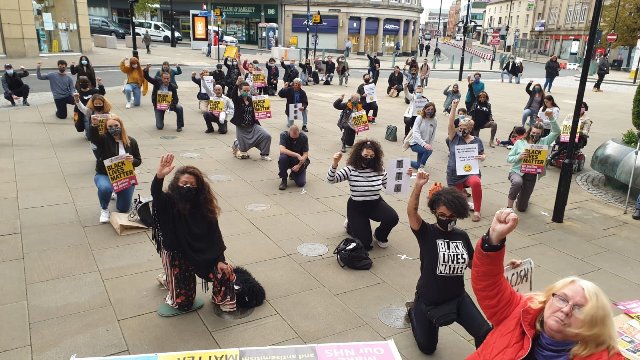 Stand Up To Racism event. [photo:StandUpToRacism.org.uk]
Stand Up To Racism event. [photo:StandUpToRacism.org.uk]
[This article appears in the current edition of The Round Table: The Commonwealth Journal of International Affairs. Opinions expressed in articles do not reflect the position of the Round Table Editorial Board.]
Over the course of June 2020, up to 26 million people across the United States participated in demonstrations under the Black Lives Matter (BLM) movement over the death of George Floyd, the 46-year-old black American who had been arrested by police in Minneapolis. This makes BLM the largest protest movement in United States history.
Black Lives Matter was formed in the US in response to the acquittal of George Zimmerman, a neighbourhood watch volunteer who murdered an unarmed black teenager, Trayvon Martin, in Florida in 2013. Trayvon was just one example of many hundreds of black men and women who have fallen victim to alleged police brutality. The movement gained traction in June 2020, when footage of the horrific death of George Floyd went viral.
The movement quickly spread across the Atlantic and took hold in the United Kingdom, with protests taking place across the country. Despite Britain being, at its core, a diverse and multicultural society, it would be wrong to suggest that we do not have our own issues with racism.
A disturbing report by the Financial Times showed that more than half of black Britons have been racially abused in the street, a figure only slightly higher than the number of black Britons who have been racially abused in the workplace. There is evidently a lot of work to be done.
However, the Black Lives Matter movement has faced controversy in the press and has also been met with what might be called ambivalence from the UK government.
Critics have focussed on its links with Marxism, a line of attack favoured by the Trump administration. In an article for the Daily Telegraph Nigel Farage, a member of the Trump fan club, condemned the toppling of Edward Colston’s statue in Bristol and branded Black Lives Matter as ‘an extreme left wing organisation which is heavily funded by those who want to overturn the norms of our society’, saying the movement ‘has a full Marxist agenda of wealth redistribution.’
These accusations have their origins in a comment made by one of the movement’s founders, who said that herself and one of her co-founders identified as ‘trained Marxists’. Miriyam Aouragh, a lecturer at Westminster School of Media and Communication, believes that these allegations are attempts to ‘smear’ the movement.
She said, ‘I think in some media, “Marxist” is dog-whistle for something horrible, like “Nazi”, and thus enables to delegitimise/dehumanise them.’
Keeanga-Yamahtta Taylor, an African American Studies professor at Princeton University, said that, although these women are prominent within the movement, ‘they don’t represent its breadth.’
Reducing what is a diverse, powerful and undoubtedly crucial movement down to links with Marxist ideology is silly. This narrative surrounding Black Lives Matter and left-wing ideologies often causes commentators to define the movement solely by being in opposition to the government’s agenda.
A leader article in the Telegraph, house magazine for the Tory Party, argued that ‘the political subtext to the Black Lives Matter campaign is that Boris Johnson and the Tories are racist.’
Johnson has a muddied history when it comes to race. His controversial article describing those who choose to wear the burka as ‘letterboxes’ has not been forgotten.
Nevertheless, defenders of the government are entitled to point out that two of the great offices of state – the Home Office and the Chancellorship – are occupied by people from ethnic minority backgrounds, making the Johnson government one of the most diverse in history.
It is important we do not let the movement be solely defined by opposition to the British government. Johnson should champion the cause of Black Lives Matter, not struggle against it. He’s under pressure from some of his supporters on the right to turn this into a culture war. It would be dangerous if he did so.
Racism is not confined to our past. There is still a lot of ground to cover when it comes to racism in the UK and Johnson needs to be very careful in the way that he engages with this issue over the coming months, especially as we move towards a post-Brexit Britain.
The United Kingdom is a place where people of different backgrounds, nationalities and ethnicities come together, each with their own separate identity, to form something bigger.
So while politicians like Farage argue that Black Lives Matter is threatening our nationhood, perhaps it would be important to consider that the view that BLM stands with the very principles that our nationhood was built upon.
Peter Oborne is a journalist and broadcaster & Millie Cooke is a freelance journalist.



